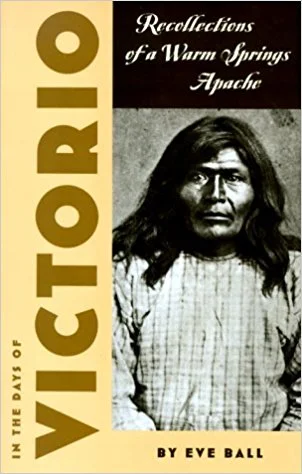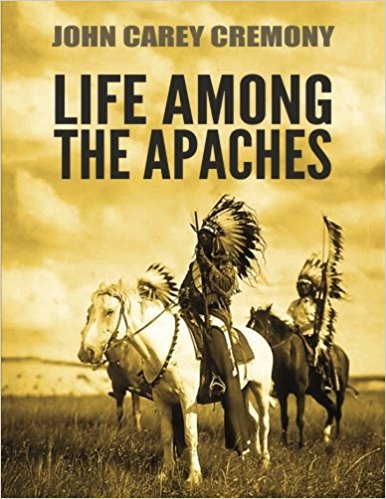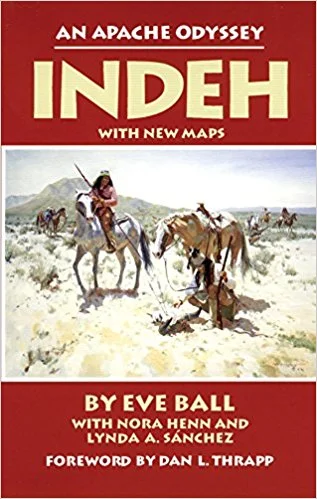In the Days of Victorio and I Fought with Geronimo
In the Days of Victorio as told to Eve Ball, by James Kaywakla and I Fought with Geronimo by Jason Betzinez
Together with Geronimo’s autobiography (which I have yet to read), these are among the very few published firsthand accounts of the Apache side of the Apache vs US and Mexican wars and they are gripping. Curiously enough, both Betzinez and Kaywakla were Warm Springs (Chihenne) Apaches, whose territory was centered on the thermal waters issuing from the Ojo Caliente at the head of the Cañada Alamosa, a paradisiacal spot between the northern end of the Black Range and the southern terminus of the San Mateo mountains. I backpacked, hiked, camped and prospected over their country for 10 years and love it too. Both of these author’s accounts cover many of the same events, but give very different perspectives on many of the major players on the Apache side. The Chihenne’s greatest chief was Victorio; both authors knew him and most of the other big names amongst the Chiricahua: Nana, Geronimo, Naiche, Juh and so forth.
As Kaywakla says: until the time he was ten he didn’t know people could die a “natural” death. All of those he’d seen were from violence. He recounts the wanderings of his tribe, exiled from their promised land at Warm Springs and in the Black Range by the cupidity, greed and dishonesty of the Whites who first promised them a reservation there and then took it away. They fought and fled their way through the mountains and deserts of New Mexico, Arizona and northern Mexico, where much of the band met their debacle in an apocalyptic battle with the Mexican Army under Col. Joaquin Terrazas, at a place called Tres Castillos, between Cd. Juarez and Chihuahua. The few survivors scattered and worked their way back into the US, where many ended up on the White Mountain reservation in Arizona, or went to the west, where they joined Juh’s band on the “Blue Mountain” (Sierra Madre Occidental).
Betzinez and his family weren’t present at Tres Castillos. But his accounts of life with Geronimo in the Sierra Madre are much more detailed and give interesting insights into their life of hit-and-run raiding interspersed with peaceful interludes in mountain hideouts.
Their final drama was flight with Geronimo from the White Mountain, Arizona reservation into Mexico. General Crook and his successor, Nelson Miles, tracked them down there using Apache scouts and ultimately convinced them to surrender. The Chihenne were shipped to Florida and then Alabama as prisoners of war. Together with the rest of the Chiricahua children, Kaywakla was sent to the Carlilse Indian School in Pennsylvania, to be de-culturated, educated in Anglo-American ways and “integrated” into American society, a hardship for both the children and their parents. Betzinez thrived in this environment, turned his back on his roots and converted to Christianity, worked as a carpenter and then in steel mills and eventually learned the trade of blacksmith. Kaywaykla was a student there with him, but is silent on this episode in his life.
The Chiricahua that survived Florida and Alabama were finally granted land in and around Fort Sill in the Indian Territories (Oklahoma). Later, about three fifths of them chose to join their tribal cousins on the Mescalero reservation in New Mexico. Betzinez was among those that stayed in Oklahoma and became farmers. He married a white Dutch-Reformed missionary woman, lived into his 90s, dying in the 1950s.
Some of the most interesting stories in these books are survival treks. Kaywakla’s grandmother, cousin and five other women were taken captive by Mexican troops after Tres Castillos and ultimately sold as slaves to the owner of a pulque Hacienda north of Mexico City. They plotted their escape for five years till an opportunity finally presented itself and they fled northward. Evading hostile Mexicans and Anglos, they walked from there all the way back to Ojo Caliente, surviving on prickly pear fruit and an occasional slaughtered calf. A Chihenne warrior, Massai, who had been a scout imprisoned and shipped east by the Army (despite loyal service in pursuit of their own people!) pried open a window and jumped train in Missouri, then walked back 1700 miles to New Mexico. He kidnapped a woman from the Mescalero reservation to be his wife, had a family and hid out in the Black Range until killed in 1917. There is a fascinating interview with one of his daughters in Indeh, reviewed by me elsewhere.
Kaywakla portrays Geronimo as a bit of a scoundrel and even a coward at the battle of Los Alisos arroyo, where he was ready to abandon the women and children to their fate in the face of a Mexican onslaught. Betzinez draws a braver and more heroic portrait, with the notable exception of Geronimo’s (and most of the other Apaches) fatal weakness for alcohol, which led them to nearly as much grief and destruction as Anglo-American and Mexican arms. On the other hand Betzinez paints Kaytenne (Kaywakla’s step-father), who played a critical role in the surrender of Geronimo’s band, as a duplicitous turncoat versus Kaywaykla’s hagiographic treatment. Nana, old and wise chief of the Chihenne, comes off as one of the real heroes of both tales, along with Victorio. Mickey Free and Chato are the traitors and villians.
The female Apache warrior, Lozen, sister of Victorio, also figures prominently in Kaywakla’s account. She had “Power” (to predict the future) and was a great help to her people in times of danger. She survived the Apache wars, but finally died in Alabama.
Surprisingly, Betzinez never mentions her, but he witnessed firsthand two examples of Geronimo’s “Power” to see faraway events happening to his people.
Together with Indeh, these are invaluable accounts from the losing side of the Apache wars and will be of interest to students of Apache culture as well as those seeking a more balanced view of the Native vs Euro-American conflicts in southwestern North America.


